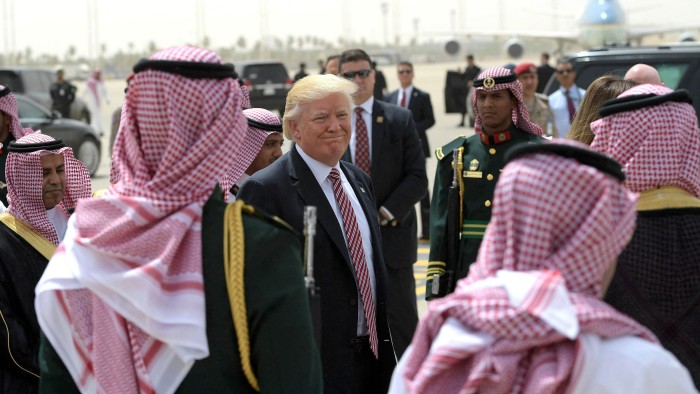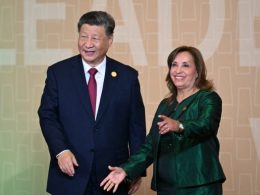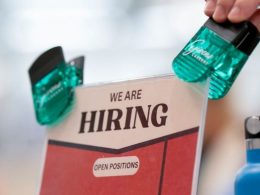Arab states are banking on Saudi Arabia to use its relationship with Donald Trump and political heft in the region to act as a check on the president-elect’s Middle East policies amid fears that he will pursue a staunchly pro-Israel agenda.
After Trump named a number of ardently pro-Israeli nominees and Iran hawks for key positions, Arab officials worry his incoming administration might approve any moves by Israel to annex the occupied West Bank, occupy Gaza or escalate tensions with Tehran.
But they hope Riyadh can temper the incoming administration’s policies in the region by leveraging Crown Prince Mohammed bin Salman’s relationship with Trump, the president-elect’s appetite for financial deals and his expected desire to strike a “grand bargain” that would lead Saudi Arabia and Israel to normalise relations.
“The key player in the region is Saudi Arabia because of their known relations with him, so it will be the linchpin of any regional actions the US might decide to do,” said an Arab diplomat.
Another Arab official said Prince Mohammed would be “key” in influencing Trump’s policies towards ending Israel’s war against Hamas in Gaza and more broadly on Palestinian issues, using the potential for normalisation with Israel as leverage.
“Saudi Arabia could heavily influence how Trump deals with Gaza and Palestine,” the official said. “A lot of the countries in the region are concerned about what comes next.”
During Trump’s first term, Saudi Arabia embraced his transactional style and his “maximum pressure” campaign against its regional rival Iran. Trump stood by Prince Mohammed when other western leaders cold-shouldered the kingdom’s de facto leader after Saudi agents murdered journalist Jamal Khashoggi in 2018.
Trump also boasted that he would broker the “ultimate deal” to resolve the Israeli-Palestinian conflict. But those plans, overseen by his son-in-law Jared Kushner, fell flat, with the Palestinians and Arab states viewing the proposals as being far too tilted in favour of Israel. Trump also cut aid to the Palestinians, closed their diplomatic mission in Washington, moved the US embassy to Jerusalem — the status of which is disputed — and recognised Israel’s claim to sovereignty over the occupied Golan Heights. He did, however, broker the so-called Abraham accords, in which the UAE and three other Arab states normalised relations with Israel.
Trump told al-Arabiya, a Saudi television channel, last month that relations between the US and Saudi Arabia during his presidency were “great, with capital letters, G. R. E.A.T”.
“So much respect for the king, so much respect for Mohammed who’s done so great, he’s really a visionary,” he said.
After US President Joe Biden took office, Riyadh maintained ties to Trump, with its Public Investment Fund — the sovereign wealth fund chaired by Prince Mohammed — investing $2bn in a private equity fund set up by Kushner.
The PIF’s governor, Yasir al-Rumayyan, shared front-row seats with Trump at a UFC fight in New York over the weekend. Trump’s courses have also hosted events run by LIV Golf, one of the PIF’s highest-profile sporting ventures.
But Prince Mohammed has recalibrated Saudi Arabia’s regional policies since Biden took office. Riyadh restored diplomatic relations with Iran in 2023 in a policy of détente it has continued to pursue since Hamas’s October 7 2023 attack triggered a wave of conflict across the region.
While a Biden administration plan to normalise relations with Israel as part of a three-way deal that would include a Saudi-US defence treaty was upended by the war, the US still considers the kingdom critical to efforts to any regional settlement to the crisis.
Riyadh has, however, hardened its criticism of Israeli Prime Minister Benjamin Netanyahu’s far-right government as the Palestinian death toll has soared.

In October, Saudi foreign minister Prince Faisal bin Farhan said normalisation with Israel was “off the table until there’s a resolution to Palestinian statehood”.
And Prince Mohammed last week used an Arab and Islamic summit in Riyadh to accuse Israel of committing “genocide” in Gaza, while condemning its war against Hizbollah in Lebanon and its strikes against Iran.
Diplomats and analysts interpreted his speech as a message to Washington and Netanyahu that the Muslim world was united in its condemnation of Israel’s military offensives and their support for the establishment of a Palestinian state. On Tuesday, Riyadh decried what it described “as extremist Israeli statements about imposing sovereignty over the West Bank”.
During his campaign, Trump promised to bring peace to the Middle East and end the war. But many of his nominees are ardently pro-Israel, including Mike Huckabee, his pick for ambassador to Israel, and Steven Witkoff, a real estate magnate he has appointed Middle East envoy.
Trump has said, however, that he wants to expand the Abraham accords, telling al-Arabiya that “the framework is there, all they have to do is reinsert it and that will happen very quickly”.
“If I win, that will be an absolute priority . . . just getting everyone in peace in the Middle East,” Trump said. “It will happen.”

Saudi Arabia would be important to unlocking any expansion of the Abraham accords, but Arab officials believe Trump will succeed only by pressuring Netanyahu to make concessions to the Palestinians on the establishment of a Palestinian state, something the Israeli PM vociferously rejects.
A second Arab diplomat argued this meant “Trump is not in need of any other player in the Middle East right now more than Saudi Arabia”.
“Trump is somebody who likes to be handed ready-deals he can take credit for,” the diplomat said. “So if MBS presents him with a deal . . . it’s a possibility, but it might be the only possibility.”
Arab officials also hope it will be harder for Trump to sideline the Palestinians as the level of outrage caused by the devastation in Gaza has put their cause back at the top of the regional agenda. Leaders worry about the conflict radicalising segments of their own populations, particularly among the youth, Prince Mohammed’s main constituency.
“Trump will need to end the war in Gaza and to do that you need to address the day after,” said the first Arab diplomat. “He will need some focus on the Palestinian track or the regional element won’t work. Saudi Arabia has said bluntly that unless there’s a Palestinian state, normalisation is not an option.”
This has provided Prince Mohammed with an opportunity to project himself, and his kingdom, as the regional leader. But the role comes with pitfalls given Trump’s unpredictability and Netanyahu’s refusal to countenance any concessions to the Palestinians.
“The Saudis have manoeuvred well by presenting themselves as not the leader, but the architect of an Arab and Muslim consensus, and in doing so, spread the responsibility,” said Emile Hokayem at the International Institute for Strategic Studies. “The question is, can it take the heat and deal with the exposure? Can it deal with the potential failure?”
The second Arab diplomat said Prince Mohammed had found the “password” to the Middle East’s leadership role.
“The only issue that unites the Arab world is the Palestinian issue,” the diplomat said. “The question is how much Saudi Arabia can invest in this . . . and how much Netanyahu will have the ability to torpedo it.”
Additional reporting by Ahmed Al Omran in Riyadh
Source link









